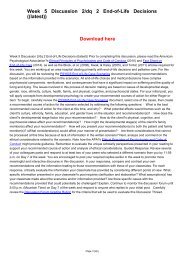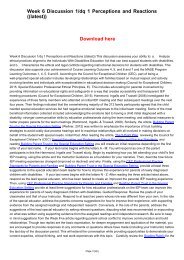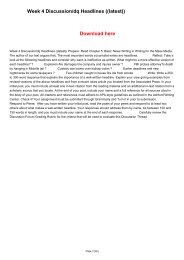PSY303 PSY303 PSY 303 Week 2 DiscussionDQ Controversy- Evaluating Medias Accuracy ((latest))
Create successful ePaper yourself
Turn your PDF publications into a flip-book with our unique Google optimized e-Paper software.
<strong><strong>PSY</strong><strong>303</strong></strong> <strong>PSY</strong>/<strong>303</strong> <strong>PSY</strong> <strong>303</strong> <strong>Week</strong> 2 Discussion/DQ<br />
<strong>Controversy</strong>- <strong>Evaluating</strong> <strong>Medias</strong> <strong>Accuracy</strong> ((<strong>latest</strong>))<br />
Download here<br />
<strong><strong>PSY</strong><strong>303</strong></strong> <strong>PSY</strong>/<strong>303</strong> <strong>PSY</strong> <strong>303</strong> <strong>Week</strong> 2 Discussion/DQ <strong>Controversy</strong>- <strong>Evaluating</strong> <strong>Medias</strong> <strong>Accuracy</strong> ((<strong>latest</strong>)) You must<br />
successfully complete the Mood and Personality Disorders quiz before you will be allowed to post in this discussion<br />
forum. Before working on this discussion, please read Chapters 6 and 9 in the course text and review any relevant<br />
Instructor Guidance. For this discussion, you will enter into a dialogue on another ongoing controversy and<br />
contemporary issue regarding abnormal psychology. Specifically, how accurate are the various media representations of<br />
psychopathology? As you enter into this conversation, analyze depictions of the identification and treatment of abnormal<br />
behavior in media sources. Then take a moment to consider and comment on the consequences of accurate and<br />
inaccurate depictions of mental health conditions in popular media. Identify at least one theoretical perspective (e.g.,<br />
biological, cognitive, psychodynamic) from the literature that informs your observations. Additionally, you should<br />
integrate information on how media shapes our cultural expectations and norms with respect to abnormal/maladaptive<br />
behavior. Be sure to utilize fundamental concepts for the ethical application of psychology from Standards 2.04 and 5.04<br />
of the Ethical Principles of Psychologists and Code of Conduct as you create your responses. If you chose to write about<br />
a movie character for your psychological report, you are welcome to include your evaluation of that movie?s depiction of<br />
psychopathology in this discussion forum. However, your evaluation alone will not suffice in the completion of this<br />
discussion.<br />
Again, the goal of this discussion forum is to have a single dynamic and respectful conversation about how<br />
psychopathology is represented in the media and the consequences of those representations, not a series of 20 to 30<br />
separate conversations. This means that every post should be in response to another post. Your instructor will be<br />
posting the initial thread to which you will respond. Only start a new discussion thread if you want to address an entirely<br />
different theme or question(s) within the discussion subject area. Additionally, only post after first carefully reading what<br />
all the others within the thread have written. A simple agree or disagree statement is insufficient to be counted as a<br />
response. When presenting your opinion, cite relevant sources (beyond your text) to support your statements. Do not<br />
repeat what your classmates have already written, and do not ignore them if they ask you questions. Any questions<br />
asked of you must be answered, including questions from your instructor. Try to keep the conversation moving forward<br />
by presenting options, insights, alternative ideas on and/or interpretations of the topics and research. You must post a<br />
response within the discussion on at least three separate days by Day 7, and your posts must total at least 800 words.<br />
There is no required word count for individual posts as long as your posts together total at least 800 words. There is no<br />
maximum number of posts for any discussion.<br />
Once your discussion is graded, your instructor will provide you with a summary of the week?s discussion and any<br />
conclusions or definitions that the class agreed on in your grading feedback. Please keep this summary in mind for<br />
future discussions in this course.<br />
Carefully review the Grading Rubric for the criteria that will be used to evaluate your discussion.<br />
Page 1/{nb}

















